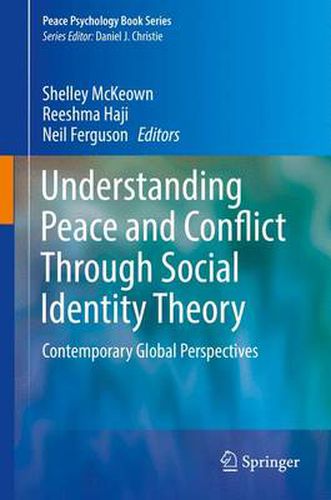Readings Newsletter
Become a Readings Member to make your shopping experience even easier.
Sign in or sign up for free!
You’re not far away from qualifying for FREE standard shipping within Australia
You’ve qualified for FREE standard shipping within Australia
The cart is loading…






This volume brings together perspectives on social identity and peace psychology to explore the role that categorization plays in both conflict and peace-building. To do so, it draws leading scholars from across the world in a comprehensive exploration of social identity theory and its application to some of the world’s most pressing problems, such as intrastate conflict, uprising in the middle east, the refugee crisis, global warming, racism and peace building. A crucial theme of the volume is that social identity theory affects all of us, no matter whether we are currently in a state of conflict or one further along in the peace process.
The volume is organized into two sections. Section 1 focuses on the development of social identity theory. Grounded in the pioneering work of Dr. Henri Tajfel, section 1 provides the reader with a historical background of the theory, as well as its current developments. Then, section 2 brings together a series of country case studies focusing on issues of identity across five continents. This section enables cross-cultural comparisons in terms of methodology and findings, and encourages the reader to identify general applications of identity to the understanding of peace as well as applications that may be more relevant in specific contexts. Taken together, these two sections provide a contemporary and diverse account of the state of social identity research in conflict situations and peace psychology today.
It is evident that any account of peace requires an intricate understanding of identity both as a cause and consequence of conflict, as well as a potential resource to be harnessed in the promotion and maintenance of peace. Understanding Peace and Conflict Through Social Identity Theory: Contemporary Global Perspectives aims to help achieve such an understanding and as such is a valuable resource to those studying peace and conflict, psychologists, sociologists, anthropologists, public policy makers, and all those interested in the ways in which social identity impacts our world.
$9.00 standard shipping within Australia
FREE standard shipping within Australia for orders over $100.00
Express & International shipping calculated at checkout
This volume brings together perspectives on social identity and peace psychology to explore the role that categorization plays in both conflict and peace-building. To do so, it draws leading scholars from across the world in a comprehensive exploration of social identity theory and its application to some of the world’s most pressing problems, such as intrastate conflict, uprising in the middle east, the refugee crisis, global warming, racism and peace building. A crucial theme of the volume is that social identity theory affects all of us, no matter whether we are currently in a state of conflict or one further along in the peace process.
The volume is organized into two sections. Section 1 focuses on the development of social identity theory. Grounded in the pioneering work of Dr. Henri Tajfel, section 1 provides the reader with a historical background of the theory, as well as its current developments. Then, section 2 brings together a series of country case studies focusing on issues of identity across five continents. This section enables cross-cultural comparisons in terms of methodology and findings, and encourages the reader to identify general applications of identity to the understanding of peace as well as applications that may be more relevant in specific contexts. Taken together, these two sections provide a contemporary and diverse account of the state of social identity research in conflict situations and peace psychology today.
It is evident that any account of peace requires an intricate understanding of identity both as a cause and consequence of conflict, as well as a potential resource to be harnessed in the promotion and maintenance of peace. Understanding Peace and Conflict Through Social Identity Theory: Contemporary Global Perspectives aims to help achieve such an understanding and as such is a valuable resource to those studying peace and conflict, psychologists, sociologists, anthropologists, public policy makers, and all those interested in the ways in which social identity impacts our world.